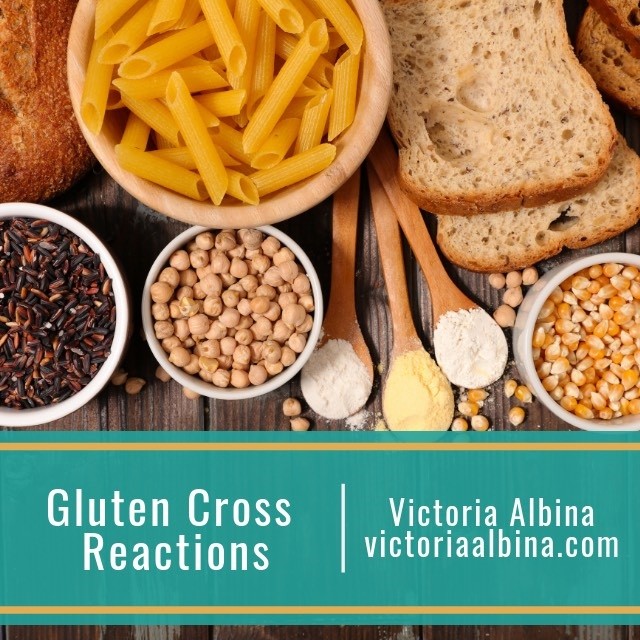Gluten Cross Reactions: When Your Body Thinks Non-Gluten Foods are Gluten

Maybe you’ve been working hard at eating gluten-free, but you’re still experiencing symptoms of gluten exposure. You’ve put down the bagels and turn down the pancakes and yet you still have brain fog, digestive issues, headaches, and fatigue. You could be having gluten cross reactions.
Even if you aren’t eating gluten you may be sensitive to foods that are causing a cross-reaction. Your body may THINK what you’re eating is gluten, even if it’s not, and it’s going into Full-Gluten-Freak-Out-Mode over some simple rice. Sigh.
Let’s take a closer look at cross-reactivity, how to tell if it’s causing your symptoms, and what you can do about it. I want you to feel your best: physically, mentally, spiritually… and reacting to your food is unlikely to leave you feeling awesome. Read on to learn about how you can lessen these bodily reactions.
How Does Gluten Cross Reactivity Work?
When you have a gluten sensitivity, your body marks gluten as a danger (called an antigen). Your immune system makes antibodies to go after those dangers. Once your body marks gluten as an antigen, your body is up in arms every time you ingest it.
Sometimes your immune system gets it wrong and also marks molecules that are similar in structure as Stranger Danger. Your body registers these similar molecules as an invader and goes after them by producing antibodies that cause inflammation. You can experience the same symptoms you would if you ate gluten or another food you know you don’t do well with.
Dairy can be a doozy

Dairy products are a common culprit of this misguided immune response. This is because casein, a protein found in dairy, is similar to a protein found in gluten. At least half of those who are gluten intolerant are also sensitive to dairy. I want to take this opportunity to remind you: lactose-free milk is not a whole food. It’s not a healthy food for most of us, in my humble opinion.
If your body is telling you that you are not, in fact, a baby cow, and you should therefore not be eating dairy, please, listen up.
That said, some folks who don’t do well with milk or ice cream can tolerate hard cheeses like parmesan or pecorino. The best way to find out is to do two months (60 days) completely off of all dairy and the foods listed below. At the end of that month, you can slowly add things in, one every 3-4 days, to see what all you react to. It’s worth it to know your tolerance and what your body prefers.
Bacteria Complicated Things

A wee hitch here is that if you have bacteria, candida or parasite overgrowths, you may continue to reacting to lots of different foods. This can make it hard to figure it out what is leading to your symptoms.
If this is the case for you, please work with a licensed holistic and functional medicine provider like myself to get the right tests to figure out your own digestive root causes.
Foods that Commonly Cause Gluten Cross-Reactivity
Your body can confuse these foods with gluten because of they have a similar protein structure:
- Corn
- Millet
- Oats
- Rice
- Yeast
- Dairy products such as milk and cheese (Alpha-Casein, Beta-Casein, Casomorphin, Butyrophilin, Whey Protein)
Gluten Cross-Reactivity Tests
One route for determining gluten reactivity is to use an elimination diet protocol.
You would stop eating the foods listed above for at least two months. If your symptoms improve, gluten cross reactivity may be the culprit.
But please note that if your gut is leaky and your inflammation is elevated, you may be more sensitive to certain foods anyway.
After the two months elimination period, reintroduce the foods one at a time by eating each it three times a day for three days to see if your symptoms return. If your symptoms return after reintroducing a food, you are likely experiencing cross-reactivity.
Another route for assessing gluten cross-reactivity is lab testing. The Cyrex Array 4 gluten cross-reactivity test can help determine if you’re gluten-like symptoms are causes by cross-reactivity.
How to Handle Gluten Cross-Reactivity
The good news is that once you determine you have gluten cross-reactivity, it’s easy to manage. The bad news is that the first step is to remove those foods from your diet.
Even though those foods don’t contain gluten, your body essentially thinks they do and is gong to react accordingly. They can cause just as much inflammation and damage as actually eating gluten. You need to remove them entirely and possibly permanently.
Research has shown that eating gluten (or foods that cause cross-reactivity) can elevate autoimmune antibodies, such as those for Hashimoto’s Thyroiditis, for up to three months. That means that even if you eat these foods only a few times a year, your body would be a near constant state of inflammation.
Once your body is clear of these foods, and inflammation has reduced, gut healing is vital. Sometimes, when the gut or digestion is healed, these reactions and symptoms are reduced. Does that mean you can go back to eating rice or dairy on the daily? Not necessarily, but you do increase your chances of being able to tolerate these foods if your leaky gut is healed.
Your body, your life, your health are worth the effort it takes to help figure out your root causes, so you can help your perfect human body to heal. Take the time – figure it out. And if you need help, I’m just a few clicks away.

My beautiful daughter sent this to me today. Sometimes I think she spends her every waking hour trying to say the “right” thing to me in order for me to have a healthy body.
This is my problem: it all seems so complicated and in that, I again, become lost.
If someone, like you could give me just one simple task at a time, I could do this.
I believe your above write is pretty close, however is it possible to trim it a bit and making it simpler?
I want to feel better, I truly do!!
I have symptoms of IBS for sure. I don’t doubt for a minute that I have “leaky gut”. When I’ve read up on what to eat and what not to, to heal this naughty situation, it seems as if I can’t eat pretty much anything!! Please, if you have the time, send me a note of simplicity to start from. I know I Can Do that!
Thank you, from Seattle Wa
Julieann Courtney
Things you may need to know:
I’m 59 (but don’t look a day over 49!) I’m 5′ 11″ , not super active, eat lots of fresh fruit, nuts-every kind, rarely ever drink milk if at all, do not eat bread, Do eat to much Surgery items and I eat lots of homemade salads (avocados, carrots, lettuce, mushrooms but No tomatoes) Help Please, I have all symptoms you mentioned above ie: insomnia, depression, anxiety, bloated tummy, gassy, fatigue.
Thank you so much
Hi Julieann,
Thanks for writing in. I think the simplest and best thing would be to connect with a health coach who can support you in your journey!
Best!
V
This has been very helpful and informative. Having struggled with these issues most my life. It’s taken me into alcoholism and addiction because I never felt good always tired headaches depression anxiety hopelessness. Finally 2yrs clean and sober just trying to figure out how to eat to stay alive seems trying at times
Congrats on your 2 years! Way to go you.
Here’s to feeling ever better, and to healing, in all the ways.
xo, Victoria